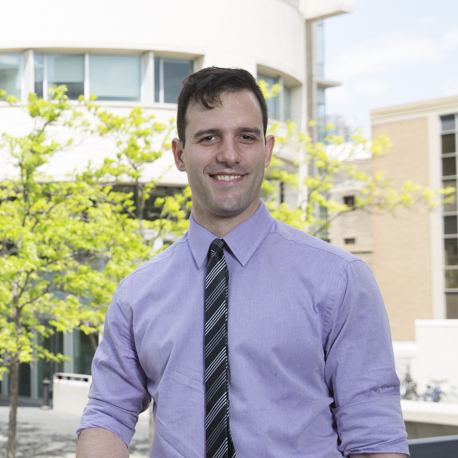David Cesar Del Rey Fernandez

David Cesar Del Rey Fernandez
Alumnus, PhD (2015), Aerospace Science & Engineering
“I have had the opportunity to work on groundbreaking research.”
I was born in Spain. When I was a young child, my family moved to Canada to find a better life. My university career has been somewhat atypical: I completed a BA in social psychology, a BASc in mechanical engineering, and a MASc in computational fluid dynamics, all at the University of Western Ontario. To say that I am passionate about learning would be an understatement.
Across numerous disciplines, U of T is consistently ranked as one of the preeminent research-intensive institutions. Besides its strong research credentials and exceptional faculty, U of T provides world-class libraries, laboratories, and recreational facilities; it is situated in one of the most beautiful and culturally diverse metropolitan areas in North America. My decision to accept an offer from U of T to pursue my PhD was heavily weighted by the reputation and research credentials of my supervisor David W. Zingg at the University of Toronto Institute for Aerospace Studies (UTIAS).
UTIAS, an internationally recognized institute for aerospace research, has a tight research community. Students regularly interact with other aerospace specialists in such diverse endeavours as fusion plasma physics, micro-satellites and, my specialty, numerical methods. Graduate students at UTIAS are fully immersed in a rich learning environment where students and faculty organically interact, ask questions, share ideas, and collaborate on groundbreaking research. As a budding research scientist, this was the type of incubator environment that I was searching for in a graduate school to foster prodigious growth.
In addition to having an extraordinary supervisor, I have had the opportunity to work on groundbreaking research. Over the course of my PhD, I have been able to contribute meaningfully by advancing the state of the art. I am a passionate person who loves to engage in discussion about research; at UTIAS, I have been surrounded by equally enthusiastic people. Sharing ideas with and learning from some very smart and creative people has been one of the most satisfying aspects of graduate school.
My PhD is focused on the development of algorithms for the solution of industrially relevant partial differential equations. The solution of such problems requires access to large computational resources; I have been fortunate to have essentially unlimited access to SciNet to perform simulations.
I have shared my research at a number of national and international conferences and workshops. Some of the more memorable ones were the conferences on computational fluid dynamics held in Hawaii and San Diego; the international higher-order workshop in Cologne, Germany; and the international conference on spectral and higher-order methods held in Salt Lake City, Utah. At these conferences, I had the opportunity to present my work and engage in meaningful dialogue with renowned academics. Conferences are a great venue to get others interested in your work, to learn about the state of the art, and to develop contacts for future collaborations.
Take advantage of all the opportunities that come your way. During your graduate studies, there will be many times that you are extremely busy and you may be tempted to forgo writing that conference paper or participate in a workshop; however, if you can do it without compromising the quality of your work — do it. Furthermore, actively search out such opportunities. It is important to keep at the bleeding edge of research, so make a habit of doing a little bit of reading every day; even if you do not go into the full details of a paper; at the very least, you are aware of the research.
At conferences, it is tempting to only attend talks directly related to your field and then use the remainder of the time as vacation. My suggestion is to attend as many talks as possible. Pick some that are not necessarily in your area of expertise — you never know what might spark the next revolutionary idea.
David is a recipient of a Canada Graduate Scholarship — NSERC and Ontario Graduate Scholarship.
